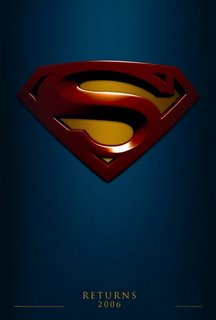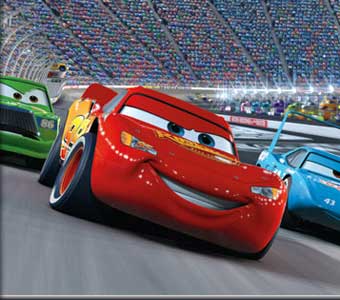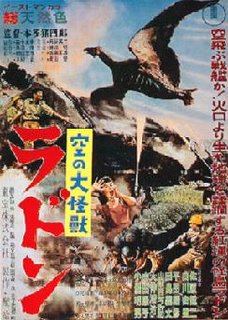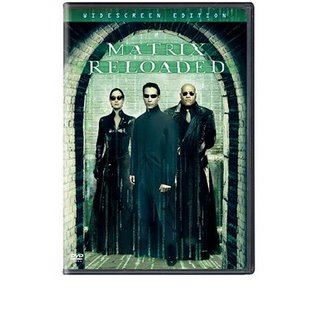 SUPERMAN RETURNS is as good a film as I expected it to be, but not quite the same film I expected. It's a terrific entertainment, full of spectacle and humor and with the idealism one naturally associates with the character. It's also the darkest entry in the series, a phrase I find myself reading and typing a lot these days. I'm about ready for my escapism to start lightening up again, but in this case, it works. Superman undergoes his greatest trials, faces his gravest doubts, and is forced to reconsider his relationship with humanity. It's powerful, yet strangely fun.
SUPERMAN RETURNS is as good a film as I expected it to be, but not quite the same film I expected. It's a terrific entertainment, full of spectacle and humor and with the idealism one naturally associates with the character. It's also the darkest entry in the series, a phrase I find myself reading and typing a lot these days. I'm about ready for my escapism to start lightening up again, but in this case, it works. Superman undergoes his greatest trials, faces his gravest doubts, and is forced to reconsider his relationship with humanity. It's powerful, yet strangely fun.Intended as a direct sequel to SUPERMAN II (bypassing III and IV, though not explicitly), the film begins with Superman (Brandon Routh) coming back from a visit to the remains of Krypton, having confirmed for himself that his homeworld is dead. He's been gone for 5 years, and in the interim, the world hasn't gone so well, Lex Luthor (Kevin Spacey) has gotten himself freed from prison, and Lois Lane (Kate Bosworth) has a child and a fiancé. She's also won a Pulitzer Prize for her opinion piece "Why the World Doesn't Need Superman." Ouch. No sooner has Clark Kent returned to his old job at the Daily Planet than disaster strikes an experimental shuttle launched from a plane (it's complicated), and Superman reappears in style, setting the damaged aircraft down in a baseball stadium. The world loves Superman again, but Lois is still a bit upset that their great hero abandoned them without a word. Meanwhile, Lex has managed to infiltrate the Fortress of Solitude and steal some of the vital energy crystals, and works out a way to use them to create a giant landmass while flooding most of the Western Hemisphere (and some of the Eastern). It's the old real estate swindle all over again, only this time billions of people are going to die and the survivors will have to live on a giant crystalline rock.
As in the original, Lex Luthor's machinations and Superman's battle against them are only part of the fun. There's plenty of drama as Clark/Superman has to compete against the new man in Lois' life (played by James Marsden of the X-MEN films) as well as stop plane crashes and bank robberies, quite a bit of snappy, goofy humor (Luthor demonstrates the crystals' power in an elaborate miniature trainset, complete with sound effects of screams and explosions as he causes small-scale calamity), and plenty of sheer visual splendor. I'm not yet entirely sure how to express the main theme of the movie- Superman is conflicted about just how he fits in with the Earth, being the last one of his kind, wanting to explore his roots but also wanting to connect with humanity instead of just pulling their fat from the fire. Reviewers have mentioned a kind of Jesus parallel, and there's some none-too-subtle symbolism, but I'm not sure that encapsulates the whole thing. Maybe it does. It's late. I'm tired.
Brandon Routh makes a convincing Man of Steel; in terms of voice he seems to be straining just a bit too much to capture Christopher Reeve's mannerisms (though I am told he sounds just a bit like that in real life, so who knows), but he has both the authority and the naiveté to pull off the dual role. Bosworth seems too young for the role of Lois, and not nearly as brassy as Margot Kidder, but it's a good performance on its own. Spacey excels as Luthor, adding his own brand of theatrics which help him to emerge from Gene Hackman's long shadow. Parker Posey is also fun as his new squeeze Kitty, Sam Huntington is a perfect Jimmy Olsen, Frank Langella a fine Perry White, and Noel Niell- who played Lois on the TV series- has a nice cameo as a dying widow whom Lex "persuades" to leave him her fortune. Tristan Lake Leabu, who plays Lois' son, is also worth noting; adding a kid to the equation could easily have spelled disaster, but he plays the part authentically and doesn't try to be overly cute.
The more I think of the criticisms I had, the more it seems like I nitpick. It is a bit long, and there are some extraneous scenes. It's never boring, just kind of... fluffy. The effects aren't as convincing as they could be, though I've never really cared about that so long as the visuals are interesting. I do wonder if the film's earnesty and moments of broad humor and 70s-style goofiness won't hurt its box office appeal, but that's not an aesthetic flaw. Maybe the public will surprise me. Hmm. Back to positives. The music score nicely quotes a lot of John Williams' original material while sounding distinctive, and there's a cool-as-crap opening credits sequence, which I wouldn't mention but for the fact that the opening credits sequence is becoming a dying art. Support the film for that if nothing else.
Bryan Singer stepped away from the X-MEN franchise to finally wrestle this film free of more than ten years of Development Hell, and his efforts have not been in vain. This is an exceptional film, and it has both a unique voice and that unmistakable feel you only get in a Superman story. It is, indeed, good to have him back.
Superman created by Jerry Siegel and Joe Shuster
Written by Michael Dougherty, Dan Harris, and Bryan Singer (story)
Directed by Bryan Singer
Grade: A






